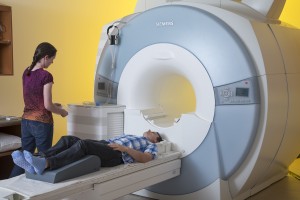BYU research for neuropsychology has taken a big leap forward by getting a brand new magnetic resonance imaging (MRI) research facility.
BYU has many programs on campus that involve researching the human body, and this new, state-of-the-art facility will propel the research of the human body even further forward.

(Photo courtesy Erin Bigler)
MRI machines magnetically take pictures of the inside the body. This can be done with any part of the body.
“BYU has a very successful neuroscience program, and human neuroscience is dependent on MRI technologies. If BYU is going to maintain a presence in getting students into medical schools and graduate schools, because of their neuroscience background, they need to have a state-of-the-art facility like this,” said Erin Bigler, Ph.D and director of the MRI research facility.
This facility is to be used for academic purposes only, but the machine is not limited to the neuroscience field on campus. All sciences can have access to the facility to conduct research. For example, exercise sciences, medical cadaver research or even exercise physiologists that need to look at the knee or ankle will be able to conduct their research accordingly.
Tracy Abildskov, a BYU lab director who has worked with Bigler for over 25 years, said, “Probably the single best reason to have it on campus is so that we can do scans (and) do research the way that we want. Normally, when we work with other groups on different types of research projects, ultimately we are subcontractors; we are hired help. Hopefully with the scanner we can be in the driver’s seat so that if we want to do a particular DTI (diffusion tensor imaging) sequence, we know the director and, assuming there are funds available, we can just get it done.”
Abildskov went on to explain that another reason for having an MRI research facility on campus is to cut down costs for research. MRI scans are expensive and can reach anywhere from $1,000 to $1,500 dollars a scan. Since BYU has been very generous to pay for the machine upfront, the scans will now cost them between $200 to $300.
“We are doing some very interesting work in memory, decision making, emotional response to stimuli and how that affects the brain, and what happens in traumatic brain injury. We are doing some really incredible work, so I think we’re going to have some very significant results that will make a difference in the field of cognitive neuroscience and neuropsychology in the next few months,” Bigler said.




